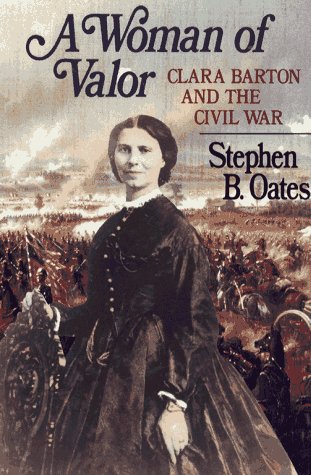
Clara Barton is one of those historical figures that sits as a vaguely understood fact in my mind. I can’t remember a time when I didn’t know about her existence, but beyond being the founder of the American Red Cross, she never bore much significance to me. But then I wrote a little article about visiting small historical sites and the “Clara Barton Missing Soldiers Office” came up in my search. A cursory perusal of the website had me fascinated, and I needed to know more.
Oates’ biography of Barton is lauded as one of the best, and the library happened to have a copy. I’ll be honest, I was a little leery to see if a biography (written by a white dude about a woman) over 30 years ago would hold up, but I was more than pleasantly surprised. Oates writes in a frank, humble style that is kind to Barton’s humanity, but doesn’t paint her into a saint. She was, above all things, a human woman living through a violent, tumultuous part of history, who’s decisions and actions made massive ripples in both her own time, and beyond it. The biography specifically focuses on Barton’s efforts during the Civil War and Reconstruction, which for me, was really interesting since that’s the parts about her that I knew least. Oates spares no detail and his heavily referenced work is an undeniably accurate view (the Reference section is almost as long as the actual book) of one woman’s fight to be legally allowed to help people.
One of the things I found most interesting about Barton’s story was her persistence. Any time she met a roadblock it wasn’t a ‘no’ to her, but simply an obstacle she needed to figure out a way around. As an upstanding woman in a tightly gendered society, she knew she couldn’t just waltz out into the ranks and do her thing without making herself into a pariah. But instead of seeing this as a brick wall, she saw it as a gate that needed a key. A second thing I found fascinating about her was that she understood the importance in her society of being friends with people in power, specifically men, and she was not afraid to use her friendships to petition for what she wanted. Just reading about the amount of letters she wrote and interviews she did to get permission to go to the front with her medical supplies was exhausting, never mind doing it and then having to travel through an active warzone to the battlegrounds to administer all the supplies. I would have given up after the 4th ‘no’ from the governmental war machine. But not only did Barton do it, but she went to battle three times, in three different zones, and then went back to the government a fourth time to petition a missing person’s division to be headed up by herself. And she never received a cent for any of it.
The other amazing thing I found interesting was that Barton’s personality was almost a contradiction of itself. On one hand, she suffered from severe depression and suicidal thoughts for most of her life, and while she never acted upon them, her diaries are full of passages about wanting to die or not feeling like her life was worth anything. On the other, she felt an intense confidence and self-satisfaction in her nursing talents and her ability to help the sick and injured. She was a loud champion of women’s rights, but she also seemed to dislike other women, particularly during her time in the field, and was very jealous and angry of any female coming into her circle of expertise. She did not ‘adjust other women’s crowns,’ so much as flick them off their heads and stomp out of the throne room.
Oates does a fabulous job and juxtaposing these two sides of her, and allowing them to live fully on the page as the same person in all her complicated and layered ways. One of my favorite parts is when Oates describes the affair she had with a married officer while stationed at Hilton Head. Oates lays it out plainly. Clara was a devoutly Christian, Victorian woman who believed infidelity was wrong. But Clara was also human woman with desires and wants who met someone she really loved who loved her back. They had an affair, and then Clara fell out of love and moved on with her life, feeling zero remorse over any of it. It was almost jarring to read, but Oates’ descriptions only made me respect her more. Clara Barton is worth reading about, in all her humanity and contradictions.
4 stars.
Bingo Square: Heart (for Clara’s unyielding persistence to help strangers in times of crisis)
